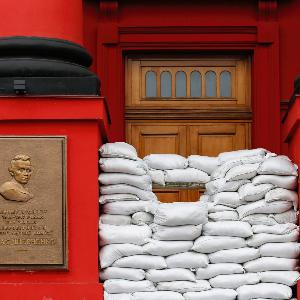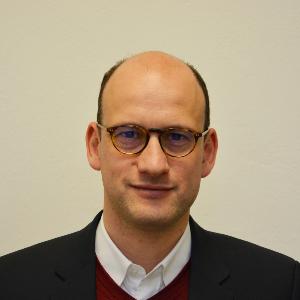“Science is always best when international collaboration is involved”
23 May 2022
What does the war in Ukraine mean for science? We asked LMU economist Fabian Waldinger.
23 May 2022
What does the war in Ukraine mean for science? We asked LMU economist Fabian Waldinger.

Entrance of Taras Shevchenko University, Kyiv, March 2022 | © IMAGO/ZUMA Wire/ Mohammad Javad Abjoushak
What does the war in Ukraine mean for science? You have studied how the first two World Wars affected academia. Against this backdrop, could you outline any possible consequences?
Fabian Waldinger: Broadly speaking, two developments are conceivable. First, because of the war in Ukraine, scientists may emigrate from both Ukraine and Russia. That is a potential disaster for these countries, though it is obviously an opportunity for the countries to hire good scientists.
Second, there is a concern, which is based on some of my previous research that a boycott of Russian scientists could slow the pace of scientific progress as a whole for a long time to come.
One of the things you have investigated is the effect of the moratorium on international scientific collaboration in the interwar period. What happened back then?
We looked at the time after World War I. Scientists in Allied countries – France, the USA and England – boycotted scientists from Germany, Austria and other Central powers. The reason was that the latter scientists, especially those from Germany, had been involved in developing chemical weapons. During the boycott, scientists from Central powers were not allowed to travel to international conferences, nor did the two sides order each other’s scientific journals. As a result, the scientific community suddenly split into two camps.
Scientific advances are slowed down without the global sharing of ideas.Fabian Waldinger
What were the consequences?
The scientists stopped citing each other’s work. Moreover, the productivity of scientists who had earlier built largely on scientific findings from abroad declined sharply. In fact, scientists from both camps, including the Allied camp, suffered. This demonstrates that scientific advances are slowed down without the global sharing of ideas.
You have also studied the emigration of Jewish academics from Nazi Germany. What effects were you able to identify?
A large number of Jewish scientists emigrated – a much higher percentage than among the overall Jewish population – with the result that more than 80 percent were able to escape the Holocaust. They spread all over the globe, but many went to countries with good universities.
The USA and England benefited the most. In contrast, this wave of emigration dealt a calamitous blow to German universities. It was a tremendous shock, especially to those departments that lost many academics.
Fifty years later, their publishing activities still lagged behind those of faculties where fewer Jewish scientists were dismissed. The negative effects were particularly large, because the Jewish scientists were, on average, more highly qualified and more successful than their non-Jewish colleagues.
The emigration was a massive brain gain for those countries and research disciplines that took in highly qualified academics. In chemistry, for example, many excellent chemists emigrated to the United States and brought their knowledge to the Unites States.
As a result, patenting by U.S. based chemists increased substantially in technology areas that received knowledge from the émigrés.
How did the German universities and the faculties affected make up the lost ground?
One could say they have never caught up. Just look at the Nobel prizes: 20 Jewish Nobel laureates lost their jobs at that time. Before 1938, Germany was the leading country in terms of Nobel laureates, especially in chemistry and physics. Emigration of Jewish scientists led to a sharp decline, although the number is now edging up again. Meanwhile, the USA, where most of the Jewish scientists emigrated to, suddenly started winning far more prizes. Emigration was not the only reason, obviously, but it certainly played a part.
First and foremost, scientists who emigrate must be given good working conditions so that they can press ahead with their research.Fabian Waldinger
Many countries are now taking in Ukrainian scientists. Can your research findings teach us anything about what matters most when this happens?
First and foremost, scientists who emigrate must be given good working conditions so that they can press ahead with their research. Our studies also show that emigration caused many top Jewish scientists to be lost to academia. Not all of them found positions in universities – in part because antisemitism was also rife in the USA.
Did it make a difference at what age the people emigrated?
For senior academics and younger scientists alike, it is naturally important to be able to continue doing their research. At least in my research, however, we find that it is easier for professors than for younger researchers to acquire a new position abroad, as the former already have contacts abroad.
On the other hand, doctoral candidates have a very hard time of it if their supervisor does not take them along with them. My research shows that, that in Nazi Germany, younger researchers that stayed suffered dramatically, above all the doctoral researchers. All of a sudden, they found themselves at departments that had lost some of the best professors who could act as supervisor. That had tremendous repercussions on their career: They published less and fewer of them became professors. Young scientists do not have so many outside options and crucially depend on having excellent researchers in their own department.
Stand-alone national strategies don’t work in academia.Fabian Waldinger
Your research goes back up to 100 years. Can we still draw parallels regarding how war and emigration might threaten science today?
In my opinion research has not changed all that much. Universities still work in a very similar way, and emigration back then was similar to today. The reasons were obviously different ones, but I think the impact on academic life remains comparable. I myself am an academic with a very global educational background. I have benefited hugely by completing much of my education in England and the USA. Many others could say the same.
Science is always best when international collaboration is involved. Stand-alone national strategies don’t work in academia.

Professor Fabian Waldinger | © LMU
Professor Fabian Waldinger studied at the London School of Economics and the University of Passau. He served as Associate Professor at the University of Warwick and the London School of Economics before his appointment at LMU in 2018. During a research visit at Harvard University, he noticed that the date stamp on many journals from the interwar period showed a delay of several years since the publication date. This triggered research on the collapse of international science in the wake of WWI, which resulted in the publication “Frontier Knowledge and Scientific Production: Evidence from the Collapse of International Science”.
As a doctoral researcher at Berkeley, Fabian Waldinger discovered an original document on the emigration of Jewish scientists in the library: a “List of Displaced German Scholars” whose aim was to help find new positions for the new arrivals. This finding laid the foundation for an extensive research program into the emigration of Jewish scientists in the Nazi period.